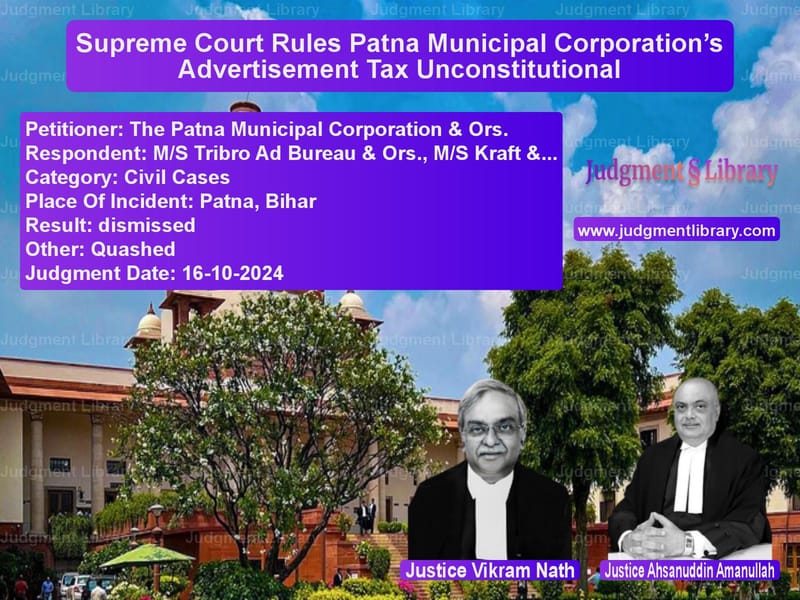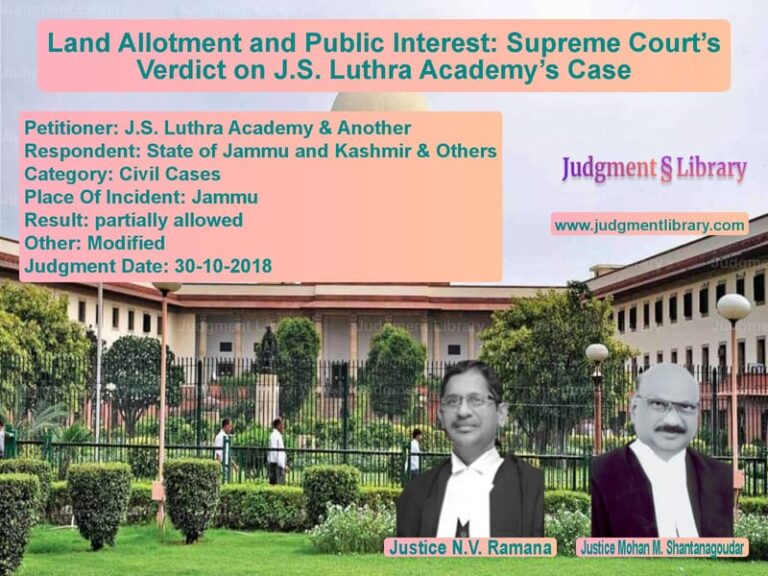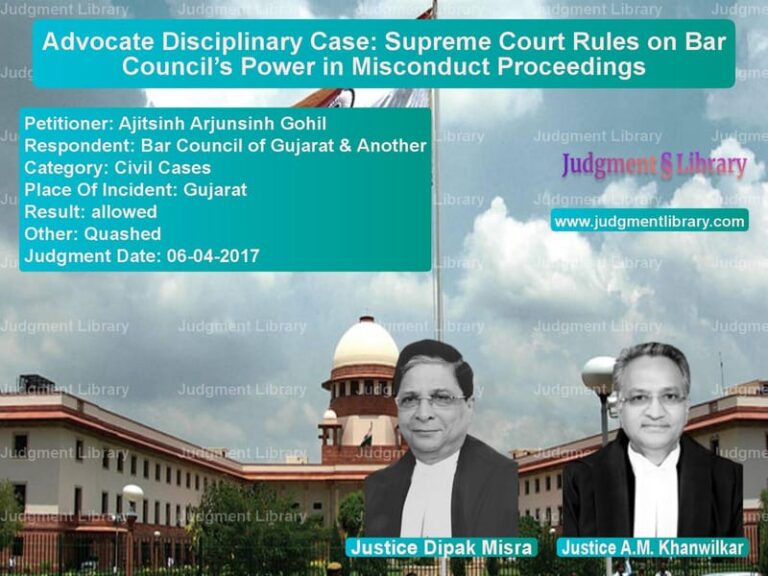Supreme Court Rules Patna Municipal Corporation’s Advertisement Tax Unconstitutional
The Supreme Court of India delivered a landmark judgment in The Patna Municipal Corporation & Ors. v. M/S Tribro Ad Bureau & Ors. and The Patna Municipal Corporation & Ors. v. M/S Kraft & Ors., addressing the constitutionality of advertisement tax levied by municipal corporations. The Court ruled that the levy of advertisement tax by the Patna Municipal Corporation was unconstitutional as it lacked legislative backing, making it violative of Article 265 of the Constitution of India. The judgment has significant implications for municipal corporations across India, clarifying their authority in taxation matters.
Background of the Case
The case arose from demands made by the Patna Municipal Corporation (PMC) on advertising agencies for the payment of royalty/tax on advertisements displayed within its jurisdiction. The controversy began in 2005 when PMC conducted a meeting with advertising agencies and decided that all agencies displaying advertisements within PMC limits would be required to pay a royalty of Re.1 per square foot per year. This rate was later increased to Rs.10 per square foot per year in 2007.
The dispute escalated when PMC began penalizing agencies that failed to pay the revised rates. In 2012, the High Court of Patna ruled in favor of the advertisers, striking down PMC’s demand as lacking legislative sanction. Dissatisfied with this ruling, PMC approached the Supreme Court.
Petitioner’s Arguments (Patna Municipal Corporation)
The PMC contended that:
- The advertisement tax was not a tax but a royalty for allowing advertisements on its land.
- The levy was agreed upon in a meeting with advertising agencies, making it a contractual obligation.
- The increase from Re.1 to Rs.10 per square foot was necessary to regulate advertising within the city.
- The PMC had authority under the Bihar Municipal Act, 2007 to impose such charges.
Respondent’s Arguments (Advertising Agencies)
The advertising agencies, including M/S Tribro Ad Bureau and M/S Kraft, opposed the tax, arguing that:
- The levy lacked legislative sanction, violating Article 265 of the Constitution, which states that no tax shall be levied or collected except by authority of law.
- The PMC’s demand was an arbitrary increase without due legislative procedure.
- Retrospective imposition of the increased charge violated principles of fairness and natural justice.
- The regulations issued in 2012, after the tax was imposed, did not authorize PMC to levy advertisement tax retrospectively.
Supreme Court’s Analysis
The Supreme Court reviewed precedents and statutory provisions, focusing on the following points:
- The Bihar Municipal Act, 2007 does not provide explicit authority to PMC to levy advertisement tax without regulations framed under it.
- Since PMC imposed the tax before framing regulations, it acted without legal authority.
- The increase in charges from Re.1 to Rs.10 per square foot was arbitrary and lacked procedural fairness.
- Royalty and tax are distinct; while tax is a sovereign function requiring legislative sanction, royalty is contractual in nature.
Key Judgment Excerpts
The Supreme Court held:
“Taxes not to be imposed save by authority of law – No tax shall be levied or collected except by authority of law.”
The Court further stated:
“A municipal corporation cannot impose a tax unless the power to do so is expressly conferred by legislation. In the absence of such power, any attempt to collect advertisement tax is unconstitutional.”
Impact of the Judgment
The ruling has far-reaching consequences for municipal corporations across India, emphasizing the necessity of legislative backing before imposing taxes. It establishes that:
- Municipal corporations must frame regulations before levying taxes.
- Any retrospective application of tax rates without statutory backing is unconstitutional.
- Royalty cannot be equated with tax; tax collection must follow due legislative process.
- Penalties imposed on advertising agencies based on unlawful tax demands must be refunded.
The Supreme Court directed PMC to refund all amounts collected unlawfully and barred further collection of advertisement tax until proper regulations are framed.
Conclusion
This judgment reinforces the constitutional principle that taxation powers are derived from legislation, not administrative decisions. By striking down PMC’s advertisement tax, the Supreme Court has ensured greater transparency and adherence to the rule of law in municipal governance. The ruling serves as a precedent for other municipal bodies, preventing arbitrary imposition of taxes and reinforcing the necessity for legal and procedural compliance.
Petitioner Name: The Patna Municipal Corporation & Ors..Respondent Name: M/S Tribro Ad Bureau & Ors., M/S Kraft & Ors..Judgment By: Justice Vikram Nath, Justice Ahsanuddin Amanullah.Place Of Incident: Patna, Bihar.Judgment Date: 16-10-2024.
Don’t miss out on the full details! Download the complete judgment in PDF format below and gain valuable insights instantly!
Download Judgment: the-patna-municipal-vs-ms-tribro-ad-bureau-supreme-court-of-india-judgment-dated-16-10-2024.pdf
Directly Download Judgment: Directly download this Judgment
See all petitions in Contract Disputes
See all petitions in Property Disputes
See all petitions in Consumer Rights
See all petitions in Debt Recovery
See all petitions in Landlord-Tenant Disputes
See all petitions in Judgment by Vikram Nath
See all petitions in Judgment by Ahsanuddin Amanullah
See all petitions in dismissed
See all petitions in Quashed
See all petitions in supreme court of India judgments October 2024
See all petitions in 2024 judgments
See all posts in Civil Cases Category
See all allowed petitions in Civil Cases Category
See all Dismissed petitions in Civil Cases Category
See all partially allowed petitions in Civil Cases Category







